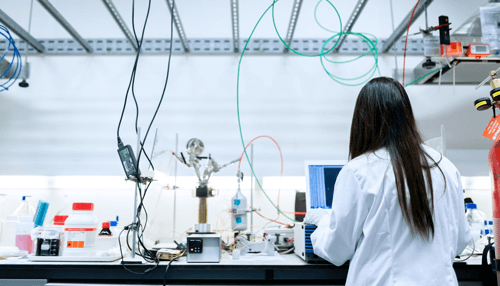The latest industry trends suggest that the vacuum pumps market will grow at a CAGR of 6% in the next six years. Vacuum pumps find applications in various industries with procedures involving vacuum creation, by removing gas molecules from sealed storage. Laboratory applications like lyophilization and evaporation involve high vapor flows, demanding higher pumping capacity. A laboratory vacuum pump should be capable of handling such high levels of fumes.
There are several vacuum pumps available in the market, each offering different capabilities. Here are a few factors in determining which vacuum pump is apt for your applications.
Check the Chemical Compatibility
Before buying, it is advisable to determine if the vacuum pump is compatible with the laboratory chemicals.
Some vacuum pumps are well-suited for solid particles and highly explosive samples, whereas others work well with liquid and gas samples.
Understanding chemical compatibility is an important criterion, failing, which can lead to potential safety hazards.
Understand Your Vacuum Range Requirements
In most cases, diaphragm pumps are the best choice for evaporative applications in laboratories. They produce enough vacuum to evaporate almost every lab solvent at room temperature.
Whereas, lyophilization requires a deeper vacuum to induce sublimation, in which the solvent moves directly from solid-state to vapor state. The sublimation requires a boiling point, lower than the freezing mark. In such cases, a deeper vacuum like the rotary vane pump is the ideal choice.
Choose a vacuum pump that has the right vacuum range, suiting your laboratory applications.
Determine Pump Flow Rate
The vacuum pump flow rate is the time taken for the pump to drain gases and air. The higher the flow rates, the lesser the time it takes to remove the vapors. There are pumps with high flow rates, while there are slow ones also available in the market.
Thus, before purchasing a vacuum pump, check its capacity to generate the required volume flow rate. For instance, a high vapor flow application will require a high flow rate vacuum pump.
Match the Lubrication Requirements
Your lab applications will determine if you need to lubricate the laboratory vacuum pump.
In the majority of applications, the preferred choice is the dry vacuum pump. However, if you want higher efficiency, a lubricated vacuum pump is perfect.
Assess the Required Technology
Not all lab activities require the same type of vacuum pumps; each demand specific pump technology to generate better results.
For example, specific research applications require clean and dry vacuum pumping. The scroll vacuum pumps are the best options for such programs.
Likewise, if you are working on ultra-high vacuum applications like analytical instrumentation, then the turbopumps are the perfect fit. More importantly, they do not require oil, as they are clean pumps.
Understand the type and pump technology required for your lab applications to make the right decision.
Assess the Maintenance and Cost
A lubricated pump will require higher maintenance, as you will have issues like oil mist and a regular oil change.
Thus, when you fix your budget, include the initial price, installation and operating charges, and not to forget the maintenance costs.
Vacuum pumps are essential lab equipment for researchers performing experiments in a lab setup. Understand your application requirements, and suitable pump technology, and consider your budget, while purchasing the right vacuum pump.



